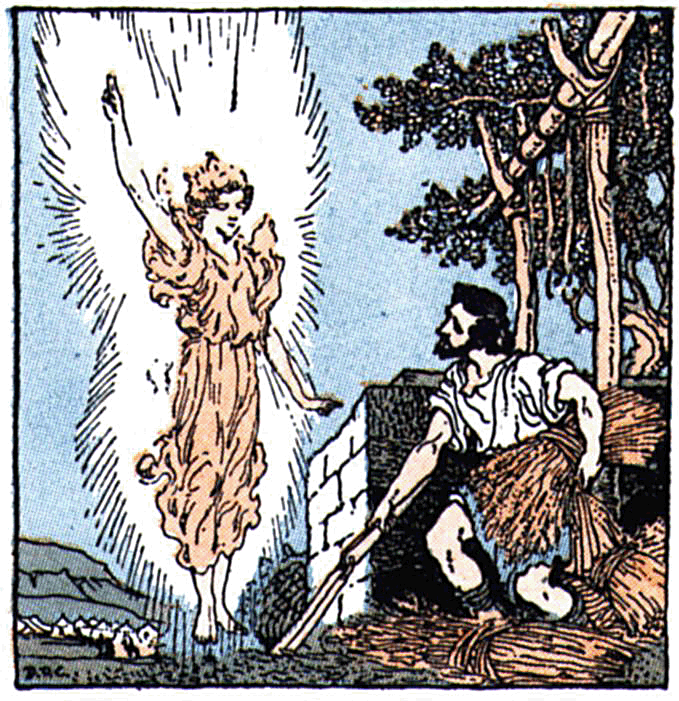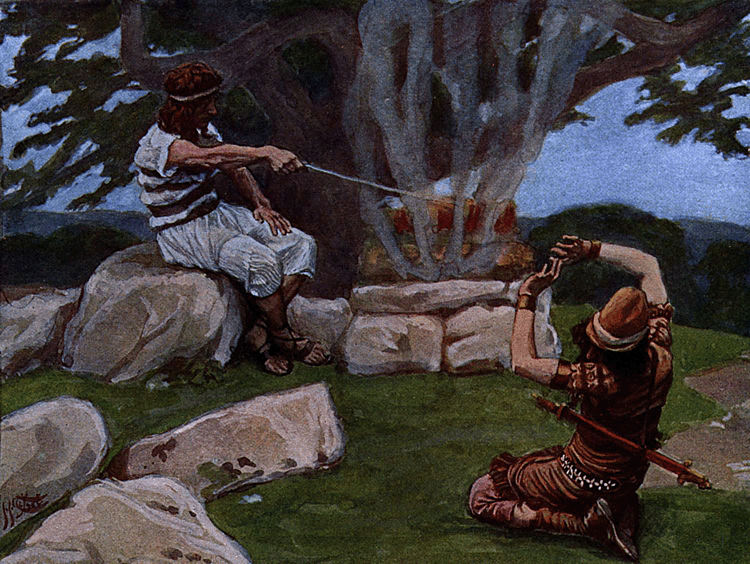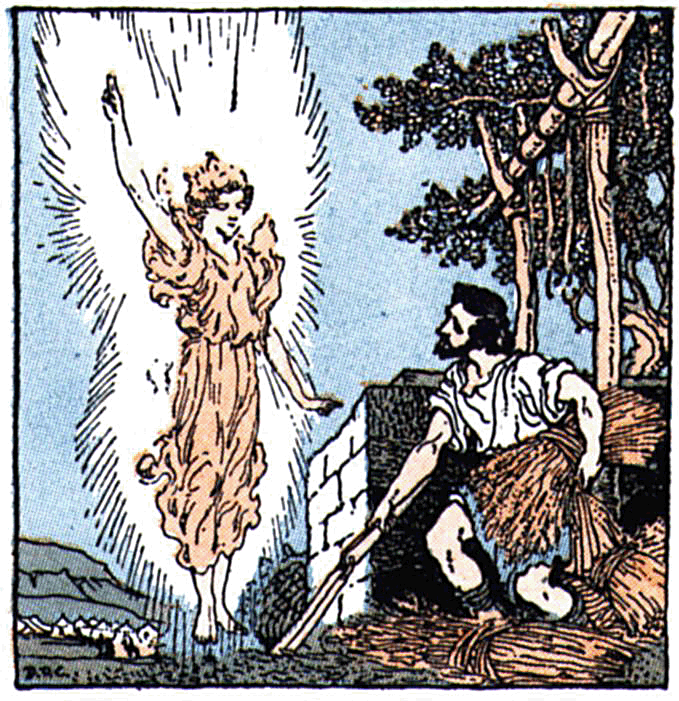
The Testimony of Yeshua’s (also known as the New Testament) summation of Gideon’s life (as well as other notable biblical characters like him) in the Bible’s famous “Hall of Faith” passage in Hebrews 11 speaks volumes about how YHVH viewed this might many of valor, despite all of his humans flaws and foibles:
And what more shall I say? For the time would fail me to tell of Gideon and Barak and Samson and Jephthah, also of David and Samuel and the prophets… who through faith subdued kingdoms, worked righteousness, obtained promises…turned to flight the armies of the aliens….They wandered about in sheepskins and goatskins, being destitute, afflicted, tormented—of whom the world was not worthy. They wandered in deserts and mountains, in dens and caves of the earth. And all these, having obtained a good testimony through faith, did not receive the promise, Elohim having provided something better for us, that they should not be made perfect apart from us. Therefore we also, since we are surrounded by so great a cloud of witnesses, let us lay aside every weight, and the sin which so easily ensnares us, and let us run with endurance the race that is set before us, looking unto Jesus, the author and finisher of our faith, who for the joy that was set before Him endured the cross, despising the shame, and has sat down at the right hand of the throne of Elohim. For consider Him who endured such hostility from sinners against Himself, lest you become weary and discouraged in your souls. You have not yet resisted to bloodshed, striving against sin. (Heb 11:32–34, 37–40; 12:1–4)
All of the saints listed in Hebrews 11 had their flaws, yet in the final analysis, the grace of Elohim covered them because they had a heart disposition that was inclined on serving and obeying him against the overwhelming odds of the societal pressure around them. They were willing to follow heaven’s mandates rather than those of men, even if it cost them their lives. Indeed, they loved not their lives unto death (Rev 12:11) doing the will of Elohim, and many perished in the process preferring the praise of Elohim over those of men (John 12:43).
The heros of Hebrews chapter eleven were activist who resisted tyrannical the civil governments that attempted to impose their unrighteous edicts upon the saints of the Most High, who followed the higher laws of Elohim. None of them passively accepted the mandates of men that required them to go against the Truth of Elohim. Instead, they refused to just sit there and acquiescently let illegal government mandates steam roll over them. No! Under the direction and empowerment of the Spirit of Elohim as directed by his Word, these Elohim-fearing saints rose up mightily in defense of righteousness and Truth.
One of these notable human weapons in the hand of Elohim was Gideon in the time of the judges of Israel. Let’s now take a closer look at the life of Gideon—a mighty man of valor—verse-by verse.
Judges 6
Judges 6:1–10, The spiritual and physical state of the nation of Israel before Gideon.After the death of Deborah the prophetess and judge, Israel fell into apostasy. The Bible simply sums up their turning away from Elohim and his ways as, “Then the children of Israel did evil in the sight of YHVH” (Judg. 6:1). As a result of their turning away from Elohim, they lost his divine protection and blessing, and were overrun by their enemies who conquered them. It seems that history repeats itself over and over again in the land where YHVH’s people live even to this day.
Judges 6:2–6, YHVH delivered them…Israel was greatly impoverished. The curses and penalties for going against YHVH’s Torah-word as predicted in Leviticus 20 Deuteronomy 28 had fallen on Israel. This sad scenario repeated itself numerous times in Israel for hundreds of years. This is because the people of Elohim failed to study their past history and learn the bitter lessons therefrom.
Judges 6:2, Dens…caves. The Israelites were driven from their own agricultural land in the valleys and were forced to take refuge in the mountains where they had to live in dens and caves for protection. There they were starving because their enemy oppressors were stealing their crops.
Judges 6:3, People of the East. These people of the East were bands of marauders who would continually menace the Israelites by stealing their crops or flocks. The Israelites had to be constantly on guard against these raiders—especially at harvest time. Other biblical writers make reference to these people as well (Job 12:6; Obad 5).
Judges 6:7, The children of Israel cried out. To Israel’s credit, they recognized that their plight was due to their sinning or breaking the laws of Elohim. This cannot be said for the people of formerly Christians nations. These nations have become so ungodly and reprobate that they are now clueless as to why their nations are a mess spiritually, economically, politically and socially. Too many people are now looking to big government to answer their problems, instead of looking inward at the sin in their own lives, and then turning to Elohim for the answers.
Judges 6:8–9, YHVH sent a prophet. YHVH is constantly sending out prophetic voices urging his backslid and apostate people to return to him and warning them of the consequences for their failure to do so. Even in our day YHVH has raised up watchman on the walls and voices crying in the wilderness warning his people to come out of Babylon (Rev 18:4), to separate themselves from the world and to not touch the unclean thing (2 Cor 6:17). Are you listening and taking action in your life to heed the warnings?
Judges 6:10, You have not obeyed my voice. It always comes down to the same lowest common denominator issue from the time of Adam and Eve in the garden until now: Will YHVH’s people obey his voice or not? To Israel’s credit, they heard the voice of Elohim through his prophet, and recognized that they had sinned, and YHVH answered them and mercifully sent them a deliverer.
Judges 6:11, Gideon threshed wheat in the winepress. Was Gideon a coward, surreptitiously threshing his wheat in the wine press for fear of the Midianites? Or was he a valiant man who was braving the murderous and thieving marauders to provide for his family off of his own farm? I prefer the latter assessment of Gideon, for that is exactly what the Messenger of YHVH called him in the next verse—“a might man of valor.” Though his human instruments may be weak, YHVH does not call cowards to do his bidding. Rather, he commissions individuals who already have the heart disposition to fulfill his purposes, and then he further empowers them to do even greater things for him.

Judges 6:12, The Angel/Messenger of YHVH appeared. This Messenger was not an angel in the typical sense of the word, but rather YHVH himself (v. 14). If no man has seen the YHVH the Father, then Gideon saw the YHVH the Son—the one who became Yeshua the Messiah. There are no other possibilities.
Mighty man of valor. Mighty is the Hebrew word gibbor referring to one who is “a warrior, champion, giant, man, mighty and valiant man.” Valor is the Hebrew word chayil meaning “might or a force” and comes from the verb meaning “to be firm or strong.” What these words teaching us is that YHVH does not choose wishy-washy pansies to be warriors in his army. Rather he chooses individuals of high character, who are steadfast and resolute and full of virtuous qualities.
Judges 6:14, Have I not sent you? When YHVH sends someone, weak and unlikely individuals are empowered to do the impossible. In this way, YHVH gets the glory, and otherwise naturally powerful and capable individuals cannot boast that they accomplished great feats by their own abilities and prowess.
YHVH does the commissioning and gives the battle plans for his human instruments to fight HIS battles. Unless YHVH build the house (or shows us how and when to fight our battles), the builders toil (or the warriors battle) in vain (Ps 127:1).
Judges 6:17, Show me a sign. YHVH did not criticize Gideon for asking for a miracle. His heart was already predisposed toward valor, but he simply needed confirmation that he had heard Elohim correctly. After all, Gideon was putting his life on the line in opposing the superior military might of the Midianites. This is different than the evil and adulterous generation to which Yeshua made reference, who seek a miraculous sign simply for its own sake (Matt 12:39). Such people have no intent of serving and obeying YHVH. This was hardly the case with Gideon.

Judges 6:18–22, My offering and set it before you. Offering is the Hebrew word minchah meaning “gift or tribute.” In the religious sense, it refers to the grain offering that the Levites offered daily on the alter of sacrifice in the Tabernacle of Moses. Whichever meaning one chooses to apply in this case, Gideon was demonstrating more than the typical Near Eastern protocols of hospitality to wandering travellers. He was honoring the Messenger of Elohim as his superior by offering him a gift or tribute. What followed was not only the Messenger’s acceptance of the Gideon’s gift, but a miraculous confirmation of his divinity, thus further confirming the validity of his message and commission of Gideon.
Judges 6:23–24, Peace by with you…YHVH Is Peace. Needless to say, this divine encounter likely rattled Gideon’s mental, emotional and spiritual “cage” just a bit. Wouldn’t you be shaken to your core if you experienced such an encounter? Furthermore, if you told others what the Divine Messenger had told you, they would likely think you were crazy. However, after the first, second and third miracle, Gideon’s passion for his mission, his believability and his ability to convince others to follow him in this mission would have taken a quantum leap. Again, Gideon was no doubt shaken, and the inner peace of his soul (i.e., his mind, will and emotions) would have been upset. In response, the Heavenly Messenger placed his peace on Gideon. The Hebrew word for peace is shalom meaning “complete inner well-being in a person in the fullest sense of the word.” It is interesting to note that the word shalom in this text is in its complete spelling form with the Hebrew letter vav or ו appearing in the word מולש, as opposed to its defective spelling (i.e. minus the vav),which also occurs in the Hebrew Scriptures. Shalom in its complete form means “a supernatural peace that can only come from Elohim” as opposed to a natural human state-of-mind peace. Gideon’s experienced of heaven’s supernatural peace was so moving that he constructed a memorial altar on that spot and called it “YHVH Shalom” or מולש הוהי.
Judges 6:25, Tear down the altar of Baal. To be an instrument in the hand of Elohim, one must first clean the sin out of one’s own life (and family). If we do not go to war fighting YHVH’s battles in a ceremonially pure state, then we will have chinks in our spiritual armor which the enemy can exploit to our disadvantage (Eph 6:16). “A curse causeless cannot land” (Prov. 26:2). Causes for curses (i.e., sin) from the enemy must be removed from one’s life. If we have sin in our lives, then the enemy, the Accuser of the brethren (Rev 12:10), will have legal grounds and a justification for attacking us. One must become spiritual fortified before going into battle, and this includes removing sin from one’s life. Gideon’s zeal and alacrity to obey YHVH was evident, for in the very night that YHVH instructed him to demolish the symbols of idolatry from his town, he did so.
Judges 6:26, Build an altar to YHVH. After the false idols are torn down in one’s life or in a nation, then the re-establishment of the true worship of YHVH in place of idolatry must occur. Then and only is YHVH ready to help us fight our battles and give us the victory over our enemies.
Judges 6:28, 30, Grove/wooden image. Heb. an asherah, which was a wooden image, pole or tree set up next to an altar in honor of Baal. Asherah, who to the Babylonians was Astarte, was the female consort of Baal who was the Canaanite god. Steeples on churches, obelisks and Christmas trees all originated from this pagan symbols which represent the male sex organ.
Judges 6:24, The Spirit of YHVH came upon Gideon. In the days before the outpouring of the Spirit of Elohim on the day of Pentecost in Acts chapter two in fulfillment of Yeshua’s promise to send the Comforter, YHVH’s Spirit would come on people, but not necessarily fill them permanently. Until that time, the Set-Apart Spirit had not yet come in the fullest sense (John 7:39).
In the days before the outpouring of the Spirit of Elohim upon his saints and before we had the Bible, we see Elohim directing his people in a more face-to-ace way via angelic visitations, appearances of the pre-incarnate Yeshua, dreams, visions and the like. This is because YHVH’s people in those days lacked both the Spirit within and the written Word of Elohim from without to guide them. Now that is not to say that YHVH does not still use these previous means to instruct and direct his children, but the necessity of it is not as great now as it was then because we have the Spirit and the Word to guide us. I’m reminded of a passage in Isaiah that seems to allude to this:
Your ears shall hear a word behind you, saying, “This is the way, walk in it,” Whenever you turn to the right hand or whenever you turn to the left. (Isa 30:21 cp. Isa 42:16; 48:17; Prov 3:5–6; John 10:3, 27; 1 John 2:20, 27)
Judges 6:36–40, Show me a sign…a fleece of wool. Fleeces of wool take several days, if not a week, to dry out depending on how thick the fleece is and on the ambient temperatures. To find it wet and then dry in 24 hours was indeed a miracle.
Judges 7
Judges 7:1, Jerubbaal (that is Gideon). Jerubbaal meaning “Baal will contend” of “let Baal plead against him” was the nickname that Joash, Gideon’s father, gave him when he tore down the altar of Baal (Judg 6:32). By contrast, the name Gideon means “feller or warrior” and is from the root Hebrew word meaning “to fell a tree, to destroy anything or to hew down.” Gideon, by the hand of YHVH, lived up to the meaning of his given name.
Judges 7:2, Lest Israel claim glory. It is only human nature for even righteous people to take for themselves at least a little of the glory that belongs to YHVH Elohim when accomplishing great things for him. YHVH eliminated the possibility of Gideon or his men from doing this by whittling the army down to almost nothing.
Thus says YHVH: “Let not the wise man glory in his wisdom, Let not the mighty man glory in his might, Nor let the rich man glory in his riches; but let him who glories glory in this, That he understands and knows Me, that I am YHVH, exercising lovingkindness, judgment, and righteousness in the earth. For in these I delight,” says YHVH. (Jer 9:23–24)
Judges 7:9–10, I will save you…But if you are afraid. Although Gideon was a mighty man of valor, it is only natural even for such a man to experience anxiety and fear when going into an unknown situation where one’s life is at stake. YHVH showed Gideon gracious mercy by encouraging him in his moment of apprehension. He will do the same for us in similar situations.
No temptation has overtaken you except such as is common to man; but Elohim is faithful, who will not allow you to be tempted beyond what you are able, but with the temptation will also make the way of escape, that you may be able to bear it. (1 Cor 10:13)
And He said to me, “My grace is sufficient for you, for My strength is made perfect in weakness.” Therefore most gladly I will rather boast in my infirmities, that the power of Messiah may rest upon me. (2 Cor 12:9, emphasis added)
Judges 7:13, Loaf of barely bread. Barley bread was used by the poorer classes as opposed to wheat. The barley bread that the Midianites saw in the vision was an indication that they despised Israel who were poorer and who had to eat barley instead of wheat.
Judges 7:14, The his companion answered. Some Bible readers have the notion that in ancient times the people were backwards and that, in the days before instant mass communications, cross cultural communication and travel was slow or non-existent. This verse shows otherwise. These Midianites who lived in the area of modern Saudi Arabia knew all about Gideon, who by his own confession, was from a non-notable tribe and family. This passage shows that in Bible times, word—including the smallest details—travelled quickly far and wide between countries.
Moreover, YHVH had gone ahead of Gideon insuring that his reputation preceded him, thus helping to demoralize the enemy even before the battle had begun. When YHVH is in your battle and is fighting for you, he goes before you to prepare the ground for victory. This is the unseen evidence of our faith.
Elohim has delivered Midian. The fear of YHVH Elohim had gone before Gideon to bring disquietude in the enemy’s camp.
Judges 7:15, Arise for YHVH has delivered. Gideon’s overhearing the Midianite’s conversation strengthened him and brought his faith to a higher level, so that now he was now ready to actually engage the enemy. That faith carried over and inspired his soldiers onward into battle.

Judges 7:16, Trumpet [Heb. shofar]. This is a reference to the ram’s horn shofar, which was, among other things, an instrument of war. The Israelites blew shofars in their famous march around Jericho. In ancient Israel, the shofar was used not only to strike fear into the enemy’s hearts, but to summon the soldiers of Elohim to battle. Watchmen on the city walls also used the shofar to warn the people of an approaching enemy attack. The shofar symbolically points to Yeshua the Messiah, the Lamb of Elohim, who defeated sin, the devil and all of his forces of darkness. The shofar will also announce the second coming of the Messiah. That is why the shofar is a lethal instrument of war in the hands of the righteous warriors of Elohim, and why the spiritual enemies of Elohim cower at its sound.
Torches inside the pitchers. It is interesting to note that some Bible teachers have seen metaphorical symbols in the torches and pitchers. Elsewhere in Scripture, humans are likened to clay or earthen vessels (2 Cor 4:7). Inside each child of Elohim is his or her personal spirit, which Scripture refers to as “the lamp of YHVH” (Prov 20:27 cp. Ps 18:28). What the story of Gideon may teach us is that when our carnal or flesh nature is broken, then the Spirit of Elohim can shine through us and help to defeat our enemies.
Judges 7:22, YHVH set every man’s sword against his companion. When YHVH is on your side and you are fighting his battles, he will fight for you, and, despite overwhelming odds, you will be victorious.
Judges 7:24, Gideon sent messengers. Through the faith of Gideon and his three hundred men, YHVH gave them the victory over their enemies. This victory inspired the other Israelites, who for one reason or another, either out of fear or reluctance to aid Gideon in this struggle against the Midianites, refused to help Gideon initially. Gideon’s testimony of YHVH’s intervention inspired others to join the fight. This is power of a good testimony to inspire others to rise up and to do great things in the power of YHVH.
Judges 8
Judges 8:1–21, The men of Ephraim said to him. Petty squabbles and jealousies among YHVH’s people is the bane of all great political and spiritual leaders. Instead of looking at the big picture and cherishing the victory, all that these small-minded brethren of Gideon could do was to focus on their own selfish interests. In this case, it was the spoils of war and their own personal material and financial gain. Gideon, however, kept his eye on the mission that YHVH had given him, and blew past these petty-minded malcontents and continued on in his divine mission to destroy Israel’s enemies.
Judges 8:21, Crescent ornaments. These symbols represented the gods these peoples of the east wore. These people were Ishmaelites (v. 24), who were the forefathers of the modern Muslim Arabs, and who worship a moon deity called Allah to this day. The crescent moon is still the universal symbol of Islam.
Judges 8:23, I will not rule over you. True leaders of Elohim do not aspire to be leaders of men, but rather are content to point people to Elohim as their true and ultimate ruler.
Judges 8:28, The country was quiet. Freedom from the oppression of merciless tyrants is not easily obtained. But when it occurs, and righteous people are in positions of leadership, a nation has rest. However, when the children of the veterans who risked and even sacrificed their lives to win the peace forget the price their forefathers paid, this is when a nation goes downhill. The younger generation of Israelites failed to learn this lesson numerous times during that nation’s long, sad history.



